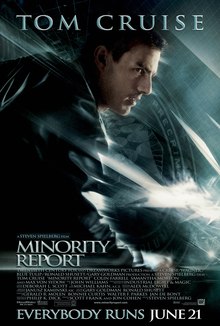Minority Report (2002 film)
| Minority Report | |
|---|---|

Theatrical release poster
|
|
| Directed by | Steven Spielberg |
| Produced by | |
| Screenplay by | |
| Based on | "The Minority Report" by Philip K. Dick |
| Starring | |
| Music by | John Williams |
| Cinematography | Janusz Kamiński |
| Edited by | Michael Kahn |
|
Production
company |
|
| Distributed by | |
|
Release date
|
|
|
Running time
|
145 minutes |
| Country | United States |
| Language | English |
| Budget | $102 million |
| Box office | $358.4 million |
| Minority Report: Original Motion Picture Score | ||||
|---|---|---|---|---|
| Film score by John Williams | ||||
| Released | June 18, 2002 | |||
| Genre | Soundtrack | |||
| Label | DreamWorks | |||
| John Williams chronology | ||||
|
||||
| Professional ratings | |
|---|---|
| Review scores | |
| Source | Rating |
| AllMusic | |
| Empire | |
| Filmtracks | |
| Movie Wave | |
| SoundtrackNet | |
| Tracksounds | |
Minority Report is a 2002 American science fiction film directed by Steven Spielberg and loosely based on the short story of the same name by Philip K. Dick. It is set primarily in Washington, D.C., and Northern Virginia in the year 2054, where "PreCrime", a specialized police department, apprehends criminals based on provided by three psychics called "precogs". The cast includes Tom Cruise as Chief of PreCrime John Anderton, Colin Farrell as Department of Justice agent Danny Witwer, Samantha Morton as the senior precog Agatha, and Max von Sydow as Anderton's superior Lamar Burgess. The film combines elements of tech noir, whodunit, thriller and science fiction genres, as well as a traditional chase film, as the main protagonist is accused of a crime he has not committed and becomes a fugitive. Spielberg has characterized the story as "fifty percent character and fifty percent very complicated storytelling with layers and layers of murder mystery and plot". The film's central theme is the question of free will versus determinism. It examines whether free will can exist if the future is set and known in advance. Other themes include the role of preventive government in protecting its citizenry, the role of media in a future state where technological advancements make its presence nearly boundless, the potential legality of an infallible prosecutor, and Spielberg's repeated theme of broken families.
The film was first optioned in 1992 as a sequel to another Dick adaptation, Total Recall, and started its development in 1997, after a script by Jon Cohen reached Spielberg and Cruise. Production suffered many delays due to Cruise's Mission: Impossible 2 and Spielberg's A.I. running over schedule, eventually starting in March 2001. During pre-production, Spielberg consulted numerous scientists in an attempt to present a more plausible future world than that seen in other science fiction films, and some of the technology designs in the film have proven prescient. Minority Report has a unique visual style. It uses high contrast to create dark colors and shadows, much like a film noir picture. The film's overlit shots feature desaturated colors which were achieved by bleach-bypassing the film's negative in post-production.
...
Wikipedia
